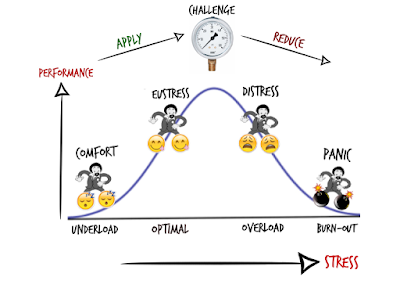Did you know stress is really important for life?
Now a day’s stress has become a popular word and almost every day we can hear many people around us say that they are under stress or it was a stressful day. So they try to mask the feeling of stress or overcome stress with alcohol, smoking, drugs, sugar without knowing that they only contribute to stress & anxiety. Water is a nectar for people who are thirsty or dehydrated but the same water in the form of deadliest flood can kill a person. Stress is just like water, well within limits it actually boosts us to achieve something in life, but when it goes beyond limit, it causes anxiety & other diseases affecting the quality of life.
At some point of time, have you ever realized life would be boring without stress? Actually, we enjoy or have fun working under a certain amount of stress (known as Eustress), only when this limit exceeds, we become distressed. Eg. When we are going to get married, we experience eustress, but when we are undergoing divorce it is distress. Many of us say we truly want to be stress free but have you ever realized that it could be possible only when we are dead. Eustress is essential for bringing joy to life. Life without stress will only cause boredom and you may feel lifeless and depressed. On the other hand, too much stress may leave you overwhelmed and have mixed state of emotions. We will be in a state of inertia without stress.
Certain amount of stress is actually necessary to enjoy life. Optimal amount of positive stress will motivate you to achieve your goals in life. It is necessary for completing tasks, taking up new challenges, for making a lifestyle change. Also, it increases our strength and health. For eg. It improves our performance at work, improves student’s learning capacity or concentration, improves our creativity. As everybody is unique and our physiological and psychological responses differs for a particular event. Optimal stress also varies from person to person. A thing that is distressing to one person may bring joy to another person. A person who prefers change of place or like to travel would not enjoy 9 to 5 desk job whereas a person who likes to work under stable condition is likely to be stressed on a job with highly variable changes in daily duties.
Stress when goes beyond our tolerance we become distressed and when this state continues, we are prone to illnesses like anxiety disorders, digestive issues, sleep problems, headaches, etc. Negative emotions like fear, pain, anger, worry, anxiety is linked to distress and this is what many people experience. Hence one should know how to manage stress by creating conditions for positive stress.
There are two types of stress – Acute / Short term and Chronic / long term. Acute stress is known as the fight / flight response where Adrenaline and norepinephrine are released by the adrenal glands which is nothing but the reaction to immediate threat. Eg. Watching a scary movie, dangerous situations, facing a wild animal when we go to a forest, etc. Generally, when the threat is passed, relaxation response sets in and the flight / fight response is inactivated so the level of stress hormones returns to normal. However, in the present-day lifestyle, there is ongoing stress & urge to react is suppressed, hence stress becomes chronic. Eg. Working under pressure / stress trying to finish deadline jobs, financial problems, family problems, etc. Acute stress usually does not cause much problems but chronic stress will have a negative impact on the body and lead to various illness like compromised immunity, digestive problems, asthma attacks, worsening of skin problem, heart attack, high blood pressure or high sugar levels, etc. As the fight / flight response is not shut off in chronic stress, high levels of the stress hormone, cortisol are released continuously as we stew on the problem which in turn produce persistent feelings of restlessness, anxiety, etc.
We believe that nagging spouse or managing your teenage kids or work pressure or bad boss causes stress. The truth is that nothing in the world can disturb you except yourself. Stress is caused due to desires - unfulfilled desire makes you unhappy and when desire is fulfilled, you want more and you become greedy. When we attach our mind to desires and worldly temptations, we lose joy and happiness but we learn to detach the mind from the material world, we actually gain wisdom and happiness. Resilience should be developed slowly. What happens when you overstretch a rubber band? It breaks. Same is with stress, when you overdo things beyond your capacity, you get stressed. People react to the fear of change. Instead of reacting we should observe our thoughts and feelings, we should see something good in the adversity. We should change our lifestyle, behavior and bring a deeper understanding of the causative factor of stress and make a choice. Change can be seen as harmful and fearful, especially when we are in distress. The same change can be seen positively for a new beginning or adaptation or meaning. Being physically active, doing meditation & yoga, listening to soft music, analysing or visualising the problems and finding suitable solutions instead of just reacting to stressful situation will help to manage stress in a positive way.

Comments
Post a Comment